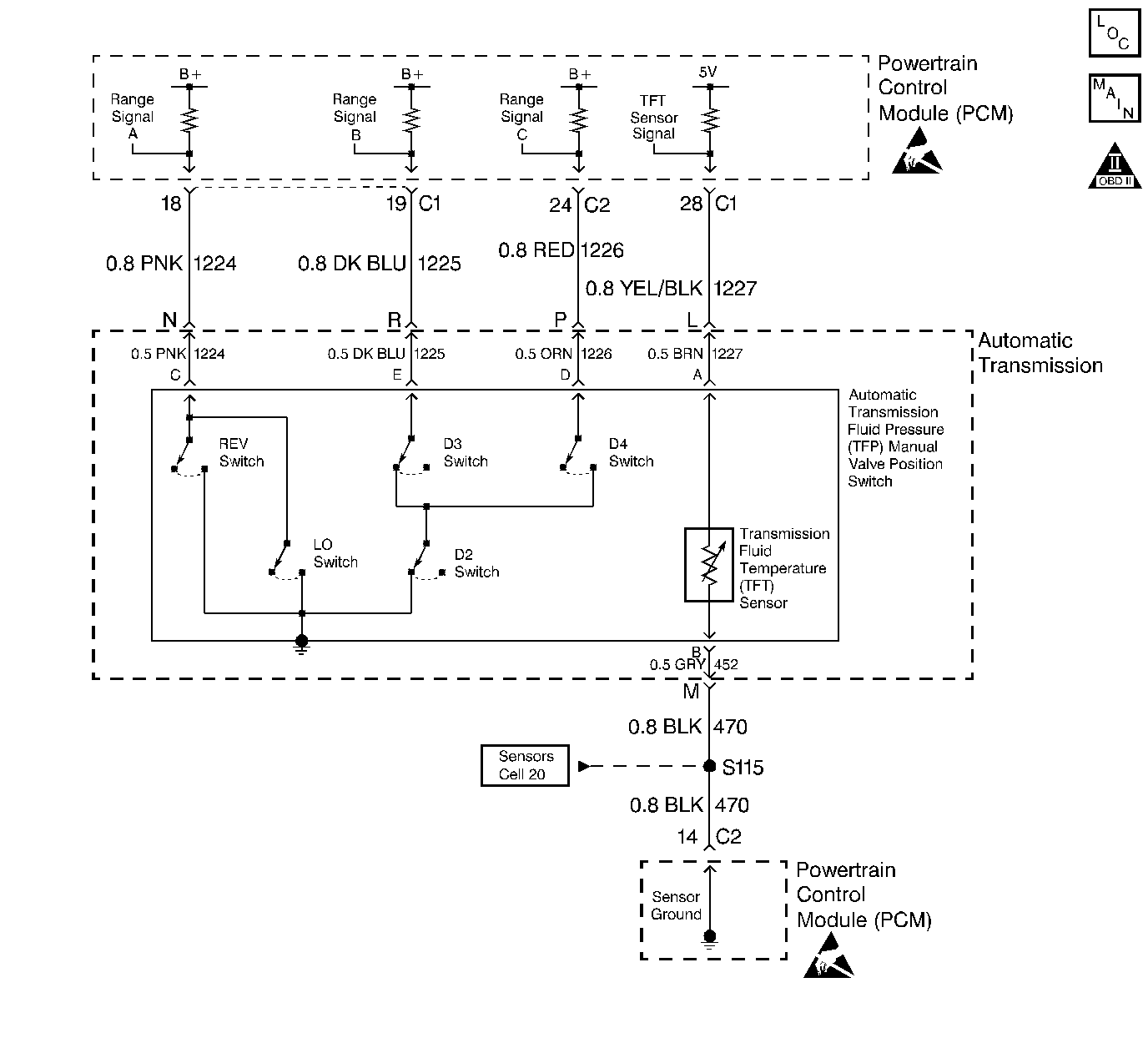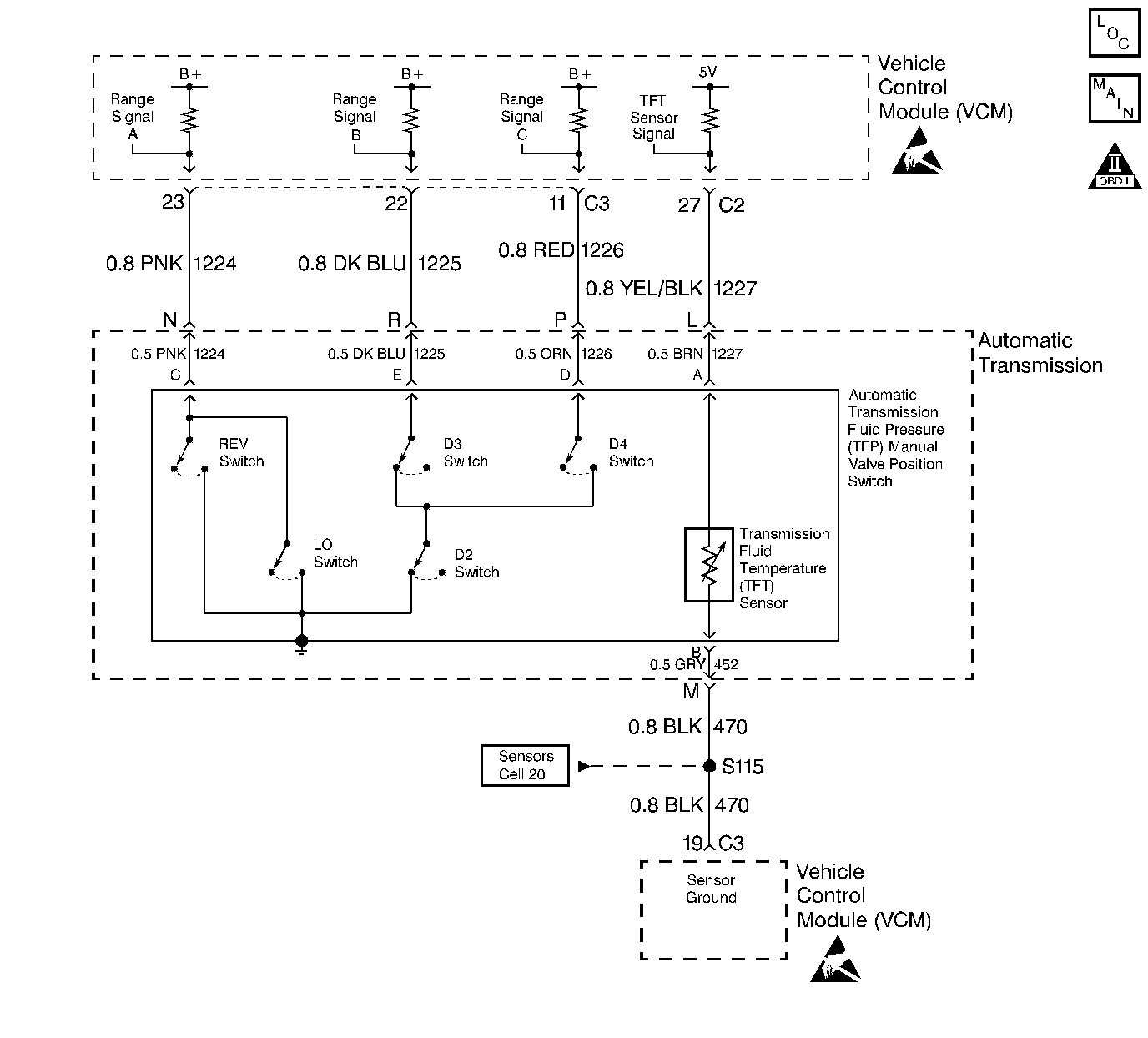DTC P1812 Transmission Fluid Overtemperature 2.2L

Circuit Description
The Transmission Fluid Temperature (TFT) sensor is a thermistor within the Automatic Transmission Fluid Pressure Manual Valve Position Switch (TFP Val. Position Sw.). The TFT sensor controls the signal voltage to the PCM. The PCM supplies a 5-volt reference to the sensor on circuit 1227. When the transmission fluid is cold, the sensor resistance is high. The PCM detects high signal voltage. As the transmission fluid temperature warms to a normal operating temperature of 100°C (212°F), the sensor resistance decreases and the voltage decreases to 1.5-2.0 volts.
When the PCM detects a high transmission temperature for a long period of time, then DTC P1812 sets. DTC P1812 is a type D DTC.
Conditions for Setting the DTC
| • | No TFT sensor DTCs P0712 or P0713 |
| • | The TFT is greater than 130°C (266°F). |
| • | All conditions met for 15 minutes |
Action Taken When the DTC Sets
| • | The PCM freezes shift adapts from being updated. |
| • | The PCM does not illuminate the Malfunction Indicator Lamp (MIL). |
Conditions for Clearing the DTC
| • | A scan tool can clear the DTC from the PCM history. The PCM clears the DTC from the PCM history if the vehicle completes 40 warm-up cycles without a failure reported. |
| • | The PCM cancels the DTC default actions when the fault no longer exists and the ignition is OFF long enough in order to power down the PCM. |
Diagnostic Aids
| • | Inspect the wiring for poor electrical connections at the PCM. Inspect the wiring for poor electrical connections at the transmission 20-way connector. Look for the following conditions: |
| - | A bent terminal |
| - | A backed out terminal |
| - | A damaged terminal |
| - | Poor terminal tension |
| - | A chafed wire |
| - | A broken wire inside the insulation |
| • | When diagnosing for an intermittent short or open condition, massage the wiring harness while watching the test equipment for a change. |
| • | The TFT sensor temperature displayed on the scan tool should rise steadily to about 100°C (212°F), then stabilize. |
| • | Inspect the torque converter stator for a possible problem. |
| • | Ask about the customer's driving habits, trailer towing, etc. . . |
Test Description
The numbers below refer to the step numbers on the diagnostic chart.
-
This step tests for a skewed (mis-scaled) sensor or shorted circuit.
-
This step simulates a TFT sensor DTC P0713.
Step | Action | Value(s) | Yes | No | ||||
|---|---|---|---|---|---|---|---|---|
1 | Was the Powertrain On-Board Diagnostic (OBD) System Check performed? | -- | ||||||
2 | Perform the following inspections:
Did you perform the inspections? | -- | -- | |||||
3 |
Important: Before clearing the DTCs, use the scan tool in order to record the Failure Records for reference. The Clear Info function will erase the data. Is the TFT greater than the specified value? | 130°C (266°F) | Go to Diagnostic Aids | |||||
4 |
Does the scan tool display change to match the TFT shown in the value column? | -40°C (-40°F) | ||||||
5 |
Refer to Electrical Diagnosis, Section 8. Did you find a problem? | -- | ||||||
6 | Replace the PCM. Refer to Powertrain Control Module Replacement/Programming , Section 6. Is the replacement complete? | -- | -- | |||||
7 | In order to verify your repair, perform the following procedure:
Has the test run and passed? | -- | System OK |
DTC P1812 Transmission Fluid Overtemperature 4.3L

Circuit Description
The Transmission Fluid Temperature (TFT) sensor is a thermistor within the TFP Val. Position Sw. The TFT sensor controls the signal voltage to the VCM. The VCM supplies a 5-volt reference signal to the sensor on circuit 1227. When the transmission fluid is cold, the sensor resistance is high. The VCM detects high signal voltage. As the transmission fluid temperature warms to a normal transmission operating temperature of 100°C (212°F), the sensor resistance decreases and the voltage decreases to 1.5-2.0 volts.
When the VCM detects a high transmission temperature for a long period of time, then DTC P1812 sets. DTC P1812 is a type D DTC.
Conditions for Setting the DTC
| • | No TFT sensor DTCs P0712 or P0713 |
| • | The TFT is greater than 136°C (277°F). |
| • | All conditions met for 410 seconds (6.8 minutes) |
Action Taken When the DTC Sets
| • | The VCM freezes shift adapts from being updated. |
| • | The VCM does not illuminate the Malfunction Indicator Lamp (MIL). |
Conditions for Clearing the DTC
| • | A scan tool can clear the DTC from the VCM history. The VCM clears the DTC from the VCM history if the vehicle completes 40 warm-up cycles without a failure reported. |
| • | The VCM cancels the DTC default actions when the fault no longer exists and the ignition is OFF long enough in order to power down the VCM. |
Diagnostic Aids
| • | Inspect the wiring for poor electrical connections at the VCM. Inspect the wiring for poor electrical connections at the transmission 20-way connector. Look for the following conditions: |
| • | A bent terminal |
| • | A backed out terminal |
| • | A damaged terminal |
| • | Poor terminal tension |
| • | A chafed wire |
| • | A broken wire inside the insulation |
| • | When diagnosing for an intermittent short or open condition, massage the wiring harness while watching the test equipment for a change. |
| • | The TFT sensor temperature displayed on the scan tool should rise steadily to about 100°C (212°F), then stabilize. |
| • | Inspect the torque converter stator for a possible problem. |
| • | Ask about the customer's driving habits, trailer towing, etc. . . |
Test Description
The numbers below refer to the step numbers on the diagnostic table.
-
This step tests for a skewed (mis-scaled) sensor or shorted circuit.
-
This step simulates a TFT sensor DTC P0713.
Step | Action | Value(s) | Yes | No | ||||
|---|---|---|---|---|---|---|---|---|
1 | Was the Powertrain On-Board Diagnostic (OBD) System Check performed? | -- | ||||||
2 | Perform the following inspections:
Did you perform the inspections? | -- | -- | |||||
Important: Before clearing the DTCs, use the scan tool in order to record the Failure Records for reference. The Clear Info function will erase the data. Is the TFT Sensor signal voltage less than the specified value? | 0.33 volt | Go to Diagnostic Aids | ||||||
Is the TFT Sensor signal voltage greater than the specified value? | 4.92 volts | |||||||
5 |
Refer to Electrical Diagnosis, Section 8. Did you find a problem? | -- | ||||||
6 | Replace the VCM. Refer to VCM Replacement/Programming , Section 6. Is the replacement complete? | -- | -- | |||||
7 | In order to verify your repair, perform the following procedure:
Has the test run and passed? | -- | System OK |
